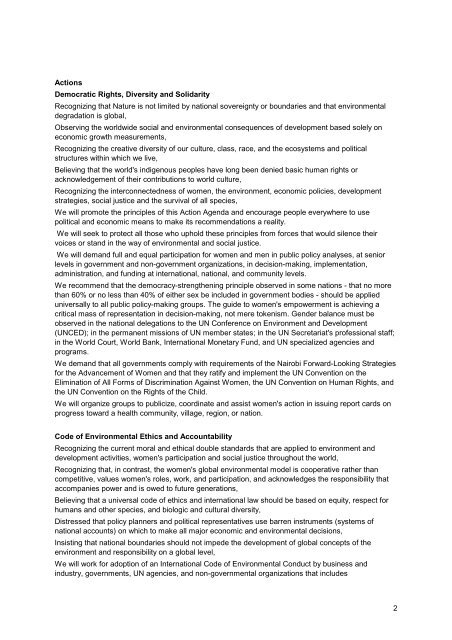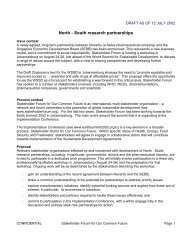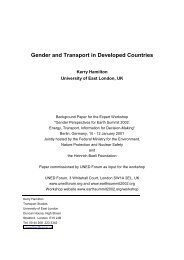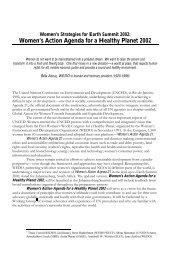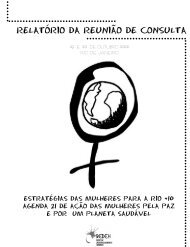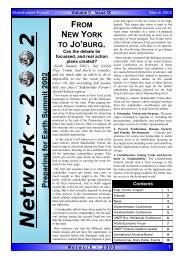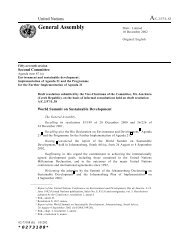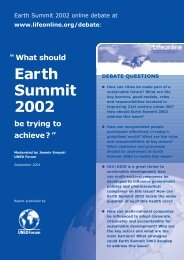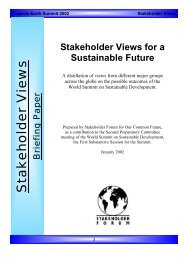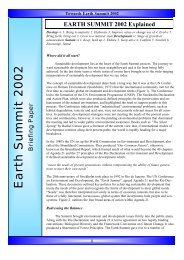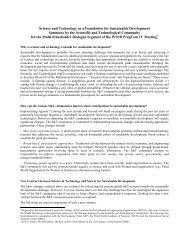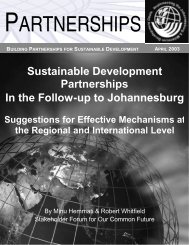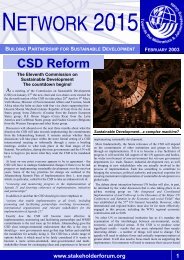Women's Action Agenda 1991 - Earth Summit 2002
Women's Action Agenda 1991 - Earth Summit 2002
Women's Action Agenda 1991 - Earth Summit 2002
You also want an ePaper? Increase the reach of your titles
YUMPU automatically turns print PDFs into web optimized ePapers that Google loves.
<strong>Action</strong>s<br />
Democratic Rights, Diversity and Solidarity<br />
Recognizing that Nature is not limited by national sovereignty or boundaries and that environmental<br />
degradation is global,<br />
Observing the worldwide social and environmental consequences of development based solely on<br />
economic growth measurements,<br />
Recognizing the creative diversity of our culture, class, race, and the ecosystems and political<br />
structures within which we live,<br />
Believing that the world's indigenous peoples have long been denied basic human rights or<br />
acknowledgement of their contributions to world culture,<br />
Recognizing the interconnectedness of women, the environment, economic policies, development<br />
strategies, social justice and the survival of all species,<br />
We will promote the principles of this <strong>Action</strong> <strong>Agenda</strong> and encourage people everywhere to use<br />
political and economic means to make its recommendations a reality.<br />
We will seek to protect all those who uphold these principles from forces that would silence their<br />
voices or stand in the way of environmental and social justice.<br />
We will demand full and equal participation for women and men in public policy analyses, at senior<br />
levels in government and non-government organizations, in decision-making, implementation,<br />
administration, and funding at international, national, and community levels.<br />
We recommend that the democracy-strengthening principle observed in some nations - that no more<br />
than 60% or no less than 40% of either sex be included in government bodies - should be applied<br />
universally to all public policy-making groups. The guide to women's empowerment is achieving a<br />
critical mass of representation in decision-making, not mere tokenism. Gender balance must be<br />
observed in the national delegations to the UN Conference on Environment and Development<br />
(UNCED); in the permanent missions of UN member states; in the UN Secretariat's professional staff;<br />
in the World Court, World Bank, International Monetary Fund, and UN specialized agencies and<br />
programs.<br />
We demand that all governments comply with requirements of the Nairobi Forward-Looking Strategies<br />
for the Advancement of Women and that they ratify and implement the UN Convention on the<br />
Elimination of All Forms of Discrimination Against Women, the UN Convention on Human Rights, and<br />
the UN Convention on the Rights of the Child.<br />
We will organize groups to publicize, coordinate and assist women's action in issuing report cards on<br />
progress toward a health community, village, region, or nation.<br />
Code of Environmental Ethics and Accountability<br />
Recognizing the current moral and ethical double standards that are applied to environment and<br />
development activities, women's participation and social justice throughout the world,<br />
Recognizing that, in contrast, the women's global environmental model is cooperative rather than<br />
competitive, values women's roles, work, and participation, and acknowledges the responsibility that<br />
accompanies power and is owed to future generations,<br />
Believing that a universal code of ethics and international law should be based on equity, respect for<br />
humans and other species, and biologic and cultural diversity,<br />
Distressed that policy planners and political representatives use barren instruments (systems of<br />
national accounts) on which to make all major economic and environmental decisions,<br />
Insisting that national boundaries should not impede the development of global concepts of the<br />
environment and responsibility on a global level,<br />
We will work for adoption of an International Code of Environmental Conduct by business and<br />
industry, governments, UN agencies, and non-governmental organizations that includes<br />
2


